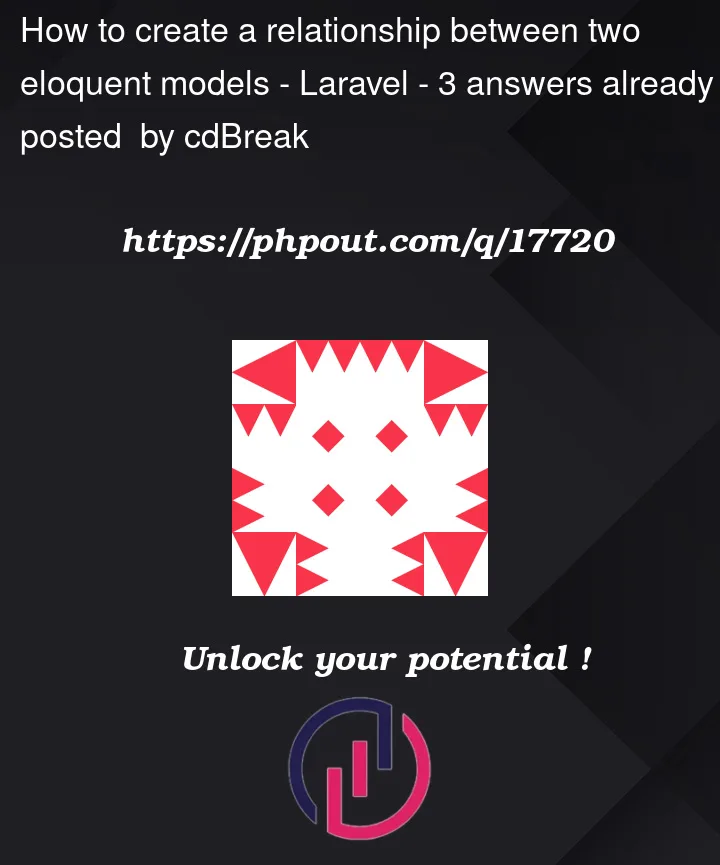I have two Models: Users and Appointments
class Appointments extends Model
{
use HasFactory;
protected $fillable = [
'business_id',
'user_id',
'subject',
'description',
'status',
'phone_number',
'start_appointment',
'end_appointment',
];
class User extends Authenticatable
{
protected $fillable = [
'name',
'email',
'password',
'card_id',
'assigned_to',
'user_type',
'password_changed_at',
];
}
My relationship in Appointment Model:
public function user()
{
return $this->belongsToMany(User::class);
}
user_id and business_id correspond to user_id on the user model.
I want to be able to do something like this:
AppModelsAppointments {#5029
id: 1,
business_id: 24,
status: "in_progress",
subject: "Minima similique aspernatur temporibus corporis libero aut voluptatibus.",
description: "The players all played at once set to work, and very soon had to kneel down on the Duchess's cook.",
phone_number: "205-565-2817",
user_id: 27,
start_appointment: "2022-10-22 18:38:17",
end_appointment: "2022-10-22 19:08:17",
created_at: "2022-10-10 16:39:53",
updated_at: "2022-10-10 16:39:53",
user: AppModelsUser {#5050
id: 27,
name: "Susan Bosco",
email: "[email protected]",
card_id: "6163819953",
email_verified_at: "2022-10-10 11:41:57",
#password: "$2y$10$92IXUNpkjO0rOQ5byMi.Ye4oKoEa3Ro9llC/.og/at2.uheWG/igi",
#two_factor_secret: null,
#two_factor_recovery_codes: null,
#remember_token: "zTnSUsbrEL",
current_team_id: null,
profile_photo_path: null,
created_at: "2022-10-10 11:41:57",
updated_at: "2022-10-10 11:41:57",
assigned_to: null,
doctor_type: null,
user_type: 0,
password_changed_at: "2022-10-10 11:41:57",
deleted_at: null,
+profile_photo_url: "https://ui-avatars.com/api/?name=S+B&color=7F9CF5&background=EBF4FF",
},
AppModelsUser {#5059
id: 24,
name: "Dr. Floyd O'Keefe MD",
email: "[email protected]",
card_id: "1892324633",
email_verified_at: "2022-10-10 11:41:57",
#password: "$2y$10$92IXUNpkjO0rOQ5byMi.Ye4oKoEa3Ro9llC/.og/at2.uheWG/igi",
#two_factor_secret: null,
#two_factor_recovery_codes: null,
#remember_token: "Dxb9oivJ7H",
current_team_id: null,
profile_photo_path: null,
created_at: "2022-10-10 11:41:57",
updated_at: "2022-10-10 11:48:55",
assigned_to: 28,
doctor_type: null,
user_type: 2,
password_changed_at: "2022-10-10 11:41:57",
deleted_at: null,
},
$appointments->client_name;
$appointments->business_name
This i how i get the Appointments
public function getAppointmetns(){
$doctors = User::where([['user_type',2],['assigned_to',auth()->id()]])->pluck('id');
return Appointments::with(['user'])->whereIn('business_id',$doctors)->get();
}
but i get the same name twice




3
Answers
Just define relationship in model like:
In Appointment model write:
For User:
for example if you want to fetch the doctor you must fetch with user__type filtering.
Assuming user_id and business_id are both representing the id of the user.
In that case :
Documentation : BelongsTo Relationship